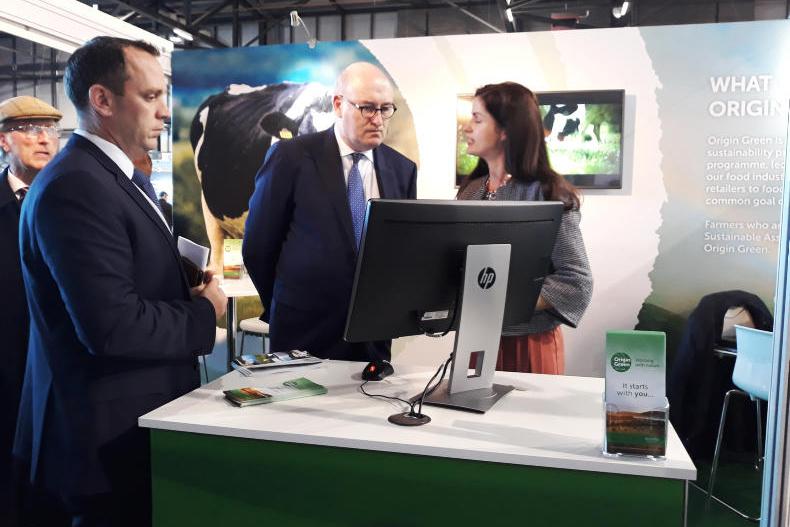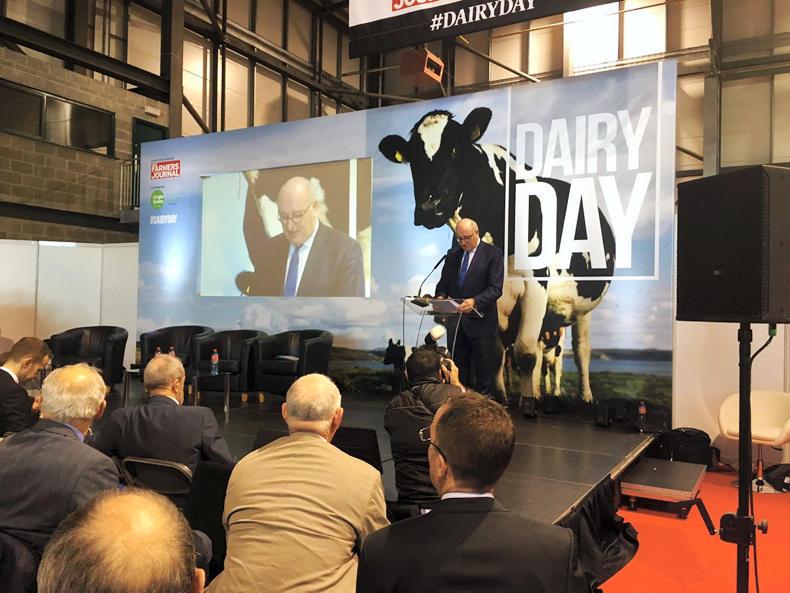The overproduction of milk, skim milk powder (SMP) in intervention and dairy markets were all on the agenda of the European Commissioner for Agriculture, Phil Hogan, at the Irish Farmers Journal Dairy Day.
The sector, both in Ireland and Europe, is at a “critical juncture”, both in relation to markets and in relation to the support offered by the Common Agricultural Policy (CAP), he said.
“The strategic decisions and actions taken by the sector in the coming months will have a strong bearing on the next decade, so I want to make sure we understand each other clearly.”
Commissioner @PhilHoganEU addressing #DairyDay.
— FJ Dairy (@FJDairy) November 23, 2017
"Milk reduction scheme brought stability to the dairy market." pic.twitter.com/HaiUdGhiuS
EU support for the dairy sector
Commissioner Hogan said that the European Commission through the framework of the CAP has remained a tireless defender of the sector through good times and bad.
“Most recently, when times were indeed bad, the Commission freed up over €1 billion to help the sector cope with severe price difficulties. And I would remind you that this was achieved without touching the CAP budget or the crisis reserve.
“This strong action, coupled with the very successful milk production reduction scheme, helped to bring order to the European dairy market and a measure of stability to our dairy farmers.
“However, my message at the time was very clear: this type of action, which amounted to solving a market problem with financial firepower is not sustainable in the long run.”
There is no guarantee that a future European Commission will be willing to take similar action.
“As I have been saying consistently over the past two years – rather than rely on the Commission to act, the industry needs to manage the problem of overproduction.
“From our side, the Commission will support this by giving producers better tools to cope with market fluctuations.
“The Commission is serious about making these changes for the benefit of farmers. And we are already delivering.”
Supply, demand and SMP
The Commissioner said that supply and demand have to be in balance if we want to pay more than lip service to the concept of market orientation.
True balance can only be achieved when operators make their business decisions based on market signals, he said.

“In the Netherlands, Friesland Campina have written to suppliers calling for restraint. I believe it is very important that industry acts in concert across all member states to manage the supply side.
“When it comes to the issue of SMP stocks, we have to manage public intervention from two angles: first, how to realistically proceed with the release of existing stocks; and second, how to prevent any further build up next year.
“In relation to the first question I have to be very blunt: the product has to be sold.
“The second issue at stake is how to avoid buying in under public intervention next year without due market justification. At a time when the next EU budget is being negotiated, I cannot have half a million tonnes of SMP in intervention stores.
“In order to ensure that buying-in operates on a rational basis, the Council of Agriculture Ministers has agreed to operate the 2018 campaign (from March 1) into a tender procedure, so that the Commission and member states decide which volumes can be accepted and at what price.”
Political reality
Commissioner Hogan said he wanted to impress upon farmers the political reality we are faced with.
“We are entering the key negotiation period for the next European budget, and the CAP is going to come under pressure as never before.
“You all understand the implications of Brexit, which is blowing a huge hole in the overall budget.
“If I am to be in the strongest possible position to defend the CAP, which currently amounts to €59 billion annually, I cannot enter the negotiations with 500,000t in storage.
“This provides an unfortunate reminder of the reality faced by my predecessor Ray McSharry: SMP mountains and wine lakes.

“Stocks at this level provide an easy narrative for those who feel the CAP coffers should be raided.
“Instead, I need all stakeholders to understand and strongly support the narrative I am constructing for the policy.”
Global markets and exports
Work should continue on new market development as over the next 10 years, global consumption of dairy products is expected to continue increasing at an annual rate of 1.8%, the Commissioner outlined.
“This is based on the projection that per capita consumption of dairy products will grow from 110kg in 2016 to close to 120kg in 2026, with the highest growth expected in Asian countries.
“This is why I have been travelling the world to find new markets for our dairy products, most recently to Saudi Arabia and Iran. The main destinations for EU butter are the USA, Saudi Arabia, Iran and China.
“This work is paying off: EU agri-food exports continued to grow in 2017. Our most recent figures showed monthly exports at a record level of €11.5 billion, adding up to a 12-month value of more than €130 billion.
“The dairy sector accounts for more than half of our current agri-trade surplus – a fact which confirms the importance of the sector. And we are keeping the foot flat to the mat. “
Dairy Day: inspections need to back up the Origin Green story
Dairy Day: the path to 2030 - what do with the next 3bn litres?